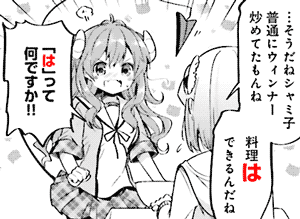Manga: Machikado Mazoku まちカドまぞく (Volume 1, Page 113, 普通に加熱することの難しさ)
Usage
The contrastive wa は is easily spotted when you have two topic-comments joined by a conjunction. For example:- neko wa doubutsu da kedo
banana wa doubutsu janai
猫は動物だけど
バナナは動物じゃない
Cats are animals but
bananas aren't animals.
Above, the comment "are animals" regarding the topic "cats" contrasts with the comment "aren't animals" that regards "bananas."
The simplest contrast is just "is" versus "is not," but you can have all sorts of contrasts, like antonyms, for example:
- neko wa suki da kedo
inu wa kirai da
猫は好きだけど
犬は嫌いだ
Cats are liked but dogs are disliked.
[I] like cats, but [I] dislike dogs.
The big problem of the contrastive wa は are its implicatures. As the name implies, we're contrasting one topic with a second topic. In the phrases above, we have both topics in the sentence. However, the contrastive wa は can contrast with an out-of-sentence topic.
For example, if I asked you: "do you like cats and dogs?"
- neko wa suki da
猫は好きだ
Cats are liked.
[I] like cats.- Implicature: not-cats are not-liked: dogs are disliked; I dislike dogs.
Even though we didn't mention "dogs" in the sentence, we implied something about them.
Implicatures are cancellable. We didn't actually say we dislike dogs, we merely implied it. For example, the speaker could say the following phrase and he wouldn't sound like he's contradicting himself:
- kedo inu wa motto suki da
けど犬はもっと好きだ
But dogs are more liked.
But [I] like dogs more.
Due to how these implicatures work, a compliment can turn into a discompliment if you use the contrastive wa は instead of the ga が particle by accident:
- kanojo wa atama ga ii
彼女は頭がいい
Her: head is good.
She is smart.- This would be the normal way of saying it.
- kanojo wa atama wa ii
彼女は頭はいい
(nuanced meaning.)- Implicature: her not-head is not-good: her looks are bad, her personality is bad, her taste in anime is bad, etc.
The same thing applies to other double subject constructions. like potentials. For example:
- Shamiko wa {ryouri ga dekiru}
シャミ子は料理ができる
{Do-able is true about cooking} is true about Shamiko.
Shamiko can cook.- The large subject Shamiko is marked by wa, the small subject ryouri is marked by ga.
If the small subject is marked by wa instead, you get this:
Manga: Machikado Mazoku まちカドまぞく (Volume 1, Page 113, 普通に加熱することの難しさ)
- Context: Momo can't cook like a normal person. She's impressed by Shamiko's normal cooking skills.
- ...sou da ne, Shamiko futsuu ni Win'naa itameteta mon ne
・・・そうだねシャミ子普通にウィンナー炒めてたもんね
That's right, Shimiko can fry wieners normally. - ryouri wa dekiru-n-da ne
料理はできるもんだね
Cooking (wa), [you] can do, huh. - "wa" tte nan-desu ka!!
「は」ってなんですか!!
What do you mean by "wa"??!!- Implicature: Shamiko's not-cooking is not-doable. She's usually a klutz who can't do anything right.
For further reference, see when to use wa は vs ga が.

No comments: